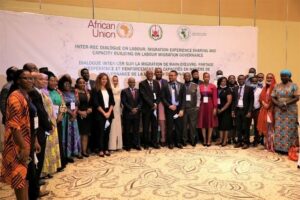Enhanced free movement of persons will spur Africa’s development – AU Commission
 The African Union Commission (AUC) says the enhanced free movement of persons and mobility of labour are critical in spurring Africa’s development.
The African Union Commission (AUC) says the enhanced free movement of persons and mobility of labour are critical in spurring Africa’s development.
The AU recognises regional integration, and especially the free movement of workers, as critical to development.
Migrant workers are crucial in the flow of goods, finance, and knowledge between countries of origin and destination and in building networks beneficial to communities of origin.
Mr Oumar Diop, the Coordinator of the AUC Joint Programme on Labour Migration Governance for Development and Integration in Africa (JLMP), said: “Given the cross-cutting nature of labour migration, a hierarchical arrangement at the RECs, involving technical and political actors, needs to be mobilised for advocacy, political buy-in, coordination and follow up on various commitments on labour migration”.
This was the outcome of a meeting of representatives of the AU Commission, Regional Economic Communities (RECs) in Africa, the International Organisation for Migration (IOM), and the International Labour Organisation, made available to the Ghana News Agency.
The meeting emphasized the need to strengthen inter-bloc dialogue on migration to make the AU’s Labour Migration Advisory Committee – a dialogue platform to improve labour migration governance in Africa – more effective.
It also established that honouring commitments enshrined in the Ouagadougou +10 Declaration and Plan of Action on employment, poverty eradication and inclusive development in Africa are important.
Delegates reiterated the need to protect migrant workers to facilitate free movement by removing hurdles on cross-border mobility to enhance skills development and recognition.
It called for the improvement in migration data collection and research, and fostering engagement with social partners to protect the African migrant worker.
Stéphanie Daviot, IOM’s Chief of Mission in Djibouti, commended the RECs for the steps taken to enhance the integration agenda and labour migration governance across the Continent, and the sustained interest for continued collaboration.
“IOM stands ready to support this agenda and to support the RECs at national and regional levels on the priorities that will be identified during this workshop,” she said.
Fathia Alwan, the Director for Health and Social Development, IGAD Secretariat, said: “Let me indicate the interest and readiness of IGAD to be part of the next JLMP project and to closely work with African Union Commission, IOM and ILO as implementing partners and, of course, with other AU-RECs”.
Regional economic communities are mandated to facilitate regional economic integration by promoting free movement of persons and capital among members of the individual regions and through the wider African Economic Community, established under the 1991 Abuja Treaty.
Regional blocs are increasingly engaged in managing migration including immigration and labour, data and statistics, gender concerns, economic and social protection, health, environment, and social dialogue.
The meeting was organised by the Joint Programme of the AU, ILO, IOM, and ECA on Labour Migration Governance for Development and Integration in Africa (JLMP) and hosted by the Intergovernmental Authority on Development.
The JLMP programme has received $17 million from the Swedish International Development Agency and the Swiss Agency for Development and Cooperation since 2018.
Source: GNA
